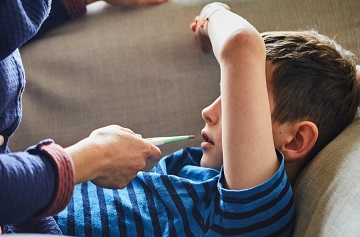Pediatric Long COVID: UK Study Uncovers Worrisome Long-Term Central Nervous System (CNS) Consequences Of COVID-19 In Children
Thailand Medical News Team Aug 09, 2023 2 years, 4 months, 1 week, 5 days, 9 hours, 4 minutes ago
Pediatric Long COVID: The COVID-19 pandemic has left no stone unturned, affecting every facet of human life, including the health of children and adolescents. Recent studies from the University of Southampton, King's College London, and the University of Nottingham shed light on the concerning long-term central nervous system (CNS) consequences of COVID-19 in young individuals.

The comprehensive study review delves into the intricate web of neurological and neuropsychiatric symptoms experienced by children with long COVID, emphasizing the need for recognition, understanding, and targeted interventions.
Neurological Manifestations of Long COVID in Children
The aftermath of COVID-19 infection in children reveals a complex tapestry of neurological symptoms that can persist for months. Headaches, cognitive deficits, anosmia (loss of smell), ageusia (loss of taste), and dizziness are among the most frequently reported neurological symptoms in
Pediatric Long COVID cases.
However, the prevalence estimates of these symptoms vary widely, ranging from mild to severe. Factors such as study design, sample size, and case identification methodologies contribute to this variability.
Cognitive deficits emerge as a significant concern, encompassing concentration difficulties, memory problems, and "brain fog." These symptoms, affecting up to 81% of cases, particularly in older children, underscore the need for deeper exploration into their origins. Headaches, which affect both acute and long COVID cases, present in various degrees of intensity, with adolescents being more susceptible. These persistent headaches, ranging from 3% to 80% prevalence, can be attributed to immune-mediated cytokine release.
Anosmia and ageusia, hallmark symptoms of COVID-19, persist in pediatric long COVID, affecting 12% to 70% of cases. The involvement of ACE2 receptors in olfactory and oral epithelial cells contributes to these symptoms' development.
Meanwhile, fatigue, a widespread symptom affecting both adults and children, plagues up to 87% of young individuals with long COVID. Systemic inflammation, sleep disturbances, and psychological factors converge to create this debilitating phenomenon.
Dizziness, albeit less common, has been reported in up to 20% of pediatric long COVID cases. While seizures primarily emerge during acute SARS-CoV-2 infection, studies suggest a potential risk of post-COVID epilepsy, warranting further investigation.
More severe neurological conditions, such as encephalitis and encephalopathy, though rare, have the potential to leave lasting cognitive and neurological deficits in survivors. Understanding the mechanisms behind these neurological symptoms is crucial for targeted interventions.
Neuropsychiatric Challenges in Pediatric Long COVID
Beyond the realm of neurological symptoms, long COVID casts a shadow over children's mental well-being. Neuropsychiatric conditions, such as mood and anxiety symptoms, obsessive-compulsive disorder (OCD), tics, eating disorders, and even psychosis a
nd mania, come to the fore.
Adolescents seem particularly susceptible to these conditions, with prevalence rates varying across age groups.
Sleep disturbances, ranging from insomnia to hypersomnia, affect up to 63% of young individuals with long COVID. These disruptions stem from a variety of factors, including inflammation, respiratory involvement, reduced physical activity, and psychosocial stressors.
Mood and anxiety symptoms are also prevalent, impacting approximately 16.5% of cases. Anxiety often overshadows depression, and while inflammation contributes, pandemic-related stressors and psychosocial factors play a vital role.
New-onset OCD symptoms have been documented in around 23% of cases, raising questions about the interplay between immune-mediated mechanisms and psychosocial stressors.
Tics, affecting approximately 9.2% of children with long COVID, may have a connection to COVID-induced changes in ACE2 pathways and altered dopamine signaling.
Changes in eating behaviors, including restrictive patterns, are associated with inflammation, gut issues, and psychosocial factors.
Moreover, rare instances of psychosis and mania demand further investigation to decipher the relationship between COVID-19 and these conditions.
The Interplay Between Biology and Psychosocial Factors
Understanding the underlying mechanisms of neurological and neuropsychiatric symptoms in pediatric long COVID requires a nuanced perspective. While some symptoms appear to be linked to direct viral effects, others are influenced by pandemic-related factors, such as social restrictions and isolation. The intricate interplay between biological pathways and psychosocial stressors contributes to the complexity of these manifestations.
The Role of Research and Future Perspectives
To combat the pervasive effects of COVID-19 on the CNS of children and adolescents, extensive research is essential. Larger sample sizes, longer follow-up periods, and comprehensive assessment of risk and protective factors are imperative to elucidate the prevalence, mechanisms, and duration of neurological and neuropsychiatric symptoms. This knowledge will empower early recognition, targeted interventions, and a multidisciplinary approach to support affected young individuals.
Conclusion
The long-term central nervous system consequences of COVID-19 in children and adolescents unveil a multifaceted landscape of neurological and neuropsychiatric symptoms. From cognitive deficits to mood disorders and beyond, the impact of COVID-19 on young minds and bodies demands urgent attention. As we navigate the complexities of this unprecedented health crisis, understanding the interplay between biology and psychosocial factors is paramount for devising effective strategies for diagnosis, treatment, and support.
The study findings were published in the peer reviewed journal: Expert Review of Neurotherapeutics.
https://www.tandfonline.com/doi/full/10.1080/14737175.2023.2239500
For the latest on
Pediatric Long COVID-19, keep on logging to Thailand Medical News.
